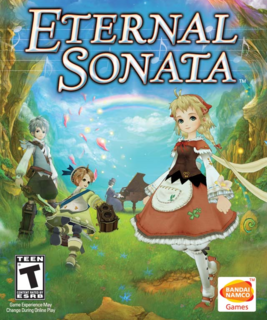A charming, colorful JRPG with excellent combat and a very different story.
The story centers around the famous classical composer Frederic Chopin as he lays dying, still young but struck with some ailment. In his mind Chopin has created a dream world that he inhabits during this period of sickness. This dream world is inhabited by characters, each with a background and story of their own, who Chopin joins up with on a variety of quests that metaphorically deal with Chopin's illness. I will leave the story details at that since it all gets incredibly deep and existential (but confusing at times) and is a story way more mature then the colorful box art would suggest.
The fact that the bulk of the story takes place in a dream world means that the creative directors could really let their minds go, and the resulting worlds you trek through are absolutely gorgeous to look at. Everything is bright and colorful with lots of detail. Coupling these landscapes with the excellent soundtrack (the majority of which is Chopin's music) provides moments where you find yourself just chilling out, checking out the scenery and relaxing to the music.
Combat, however, is not relaxing and it is one of the components to the game in which it really shines. Unlike many traditional JRPGs, there are NO random encounters. You will see each and every monster before you fight them and how you approach the enemy will dictate the turn sequence (yes, it is turn-based combat). Approach from behind and you get the jump on them, sometimes being able to beat them before they even get to take a shot at you. If you don't want to fight them you can maneuver around them and keep on going, skipping them completely. In the beginning it's best to fight each and every one so you can level up faster, but once you have leveled up enough you can start skipping more fights.
The cast of characters to fight with is fairly large - 10 in all - including Chopin himself. The mix is between melee and ranged fighters, some with the ability to heal. Each character has some magic ability with access to a number of spells or special powers. As you level up you gain new powers. Each power is either a light or dark power and it depends on whether you are standing in a lit or dark area as to which power you can use. Unleashing these powers during combat usually leads to some colorful explosion of some sort on the screen and they are essential to getting through the game.
Tactically this game uses a system that evolves as you play. In the beginning it acts more like a traditional turn-based RPG in that you can take as much time as you want to decide how to begin your attack and then a meter will run down the time you have to attack within once you start. As you progress you unlock new party levels which will change the tactical rules. By the end your meter will begin running out as soon as your turn starts so you'd better act quick.
There is also a system called "echoes" in which each strike builds up an echo meter in the lower right corner. At any point you can unleash your magical attack and the higher the echo multiplier is at the time the attack will be that much stronger. As you unlock the higher party levels you will be able to create harmony chains which allow you to carry over the echo meter to the next character to chain attacks.
So that's the good stuff - fun combat, gorgeous visuals, solid RPG structure and a different and interesting story. What's the bad? If you read other reviews you will see one common complaint and that is regarding the game's pacing. It is sssllloooowwww... This is to be expected, it is a JRPG after all, which can mean long drawn out cut scenes and long pauses in between characters talking to each other. It is enough to drive you nuts sometimes, or put you to sleep.
You can skip these cut scenes but with a story this out there, you'll be really lost if you skip. At different points in the game you will be treated to a photo interludes of European cities while subtitles tell you the real story of Chopin's life while his music plays in the background. It's a nice touch and something you don't see everyday (if you have the patience to sit through them).
To those achievement junkies out there, Eternal Sonata will disappoint. My first playthrough took about 27 hours and I ended with 14 of 22 achievements for 170 points. If you want the rest it will take an entire 2nd playthrough and defeating the two bosses in the Mysterious Union tower, which will require you to level grind in order to be powerful enough to take them down. It's a good game, but I wasn't about to spend another 2 weeks with it just to get the points. Maybe one day I'll go back to it.
If you give Eternal Sonata a chance you will find it is definitely one of the better JRPGs to hit the 360, which is really saying something considering all the big name JRPG makers that have released games on the console this past year. The difference is the story (which is unlike any other you're likely to play for some time to come), the solid design mechanics including the stellar combat, and the eye candy you're given to stare at. It's a well made game that many will look back on and point to as an example of a JRPG done differently and right.

